Air Conditioning
3 Essential Fixes for Air Conditioning Heat Pump Issues
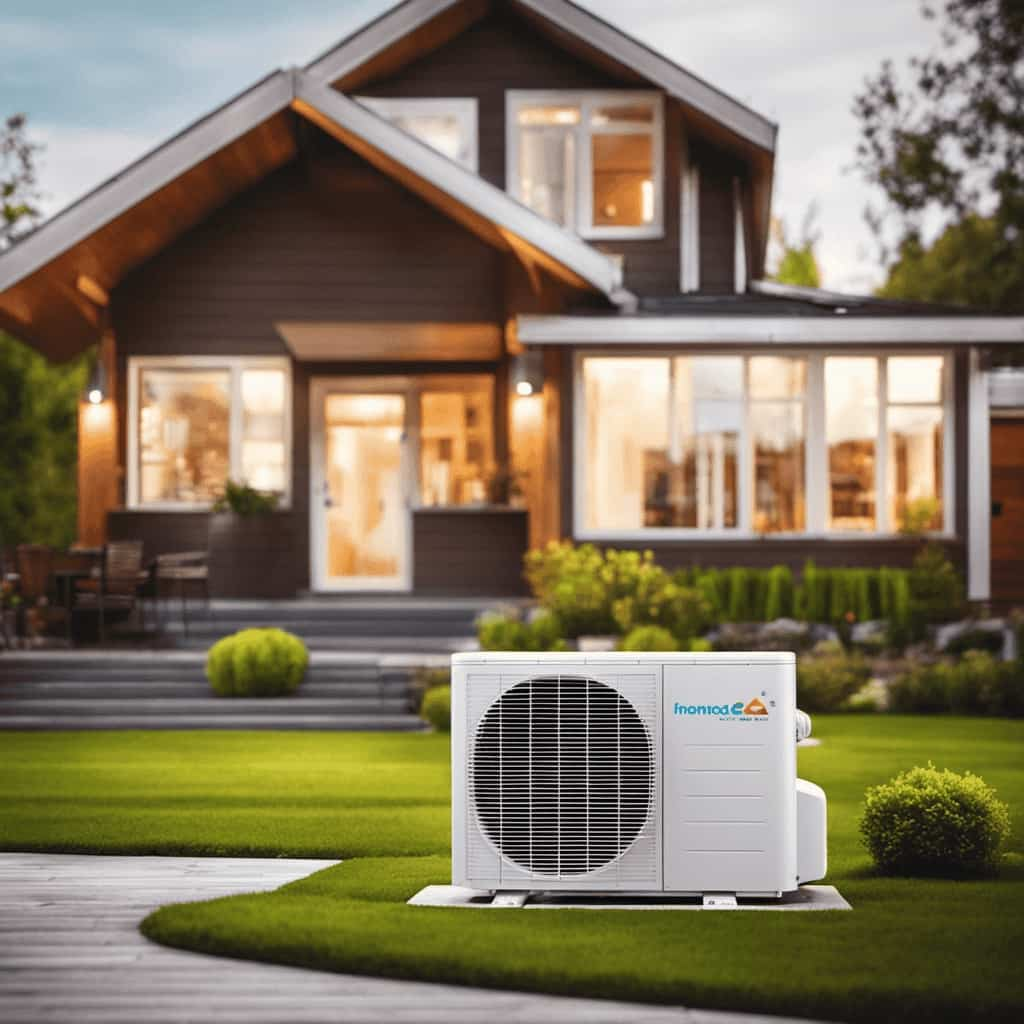
Fed up with enduring the sweltering heat of summer? We’ve got you covered! In this article, we’re going to unveil three crucial solutions to problems with your air conditioning heat pump.
Our goal is to provide practical solutions to keep you and your loved ones cool and comfortable. From troubleshooting heating problems to fixing cooling issues, we’ll guide you through the process step-by-step.
So sit back, relax, and let us help you enjoy a refreshing and worry-free summer!
Key Takeaways
- Malfunctioning compressors and troubleshooting techniques are common heat pump problems that need to be addressed.
- Inspecting for damage or wear and tear is important in identifying and fixing heat pump issues.
- Insufficient airflow and dirty filters can cause heating issues, so regularly checking and replacing air filters is crucial.
- Professional help should be sought for refrigerant leaks and electrical problems, while thermostat settings and batteries should be checked for cooling problems.
Common Heat Pump Problems
We often encounter malfunctioning compressors as a common heat pump problem. Proper heat pump maintenance is crucial to prevent such issues. Regularly cleaning and inspecting the compressor can help identify any potential problems early on. Troubleshooting techniques can also be employed to diagnose and fix compressor malfunctions. This may include checking the electrical connections, testing the capacitor, and ensuring proper refrigerant levels. Additionally, it’s important to inspect the compressor for any signs of damage or wear and tear. By addressing these issues promptly, you can avoid more serious damage to the heat pump system.

Now that we’ve discussed common heat pump problems, let’s transition into the next section where we’ll explore troubleshooting heating issues.
Troubleshooting Heating Issues
To address heating issues, we’ll explore troubleshooting techniques and potential solutions. Here are four common problems that can arise with heat pumps and their corresponding fixes:
-
Insufficient airflow: Check the air filters and clean or replace them if necessary. Dirty filters can restrict airflow and reduce heating efficiency.
-
Thermostat issues: Ensure that the thermostat is set to the desired temperature and in the correct mode (heating). If the thermostat isn’t functioning properly, consider replacing it.

-
Refrigerant leaks: Low refrigerant levels can affect the heat pump’s ability to generate heat. A certified technician should be called to locate and repair any refrigerant leaks.
-
Electrical problems: Faulty wiring or malfunctioning components can cause heating issues. It’s essential to have a professional inspect and repair any electrical problems to ensure safe and efficient operation.
Regular heat pump maintenance and prompt heat pump repair can help prevent and address heating issues, ensuring optimal performance and comfort in your home.
Fixing Cooling Problems
One common cooling problem that can occur with air conditioning heat pumps is inadequate airflow, which can be caused by a dirty or clogged air filter. To ensure proper cooling system maintenance and prevent this issue, it is essential to regularly clean or replace the air filter. Additionally, other cooling problems can arise, such as refrigerant leaks or faulty thermostats. If you suspect a refrigerant leak, it is best to contact a professional for air conditioning repair. Another cooling problem that may be easily fixed is a malfunctioning thermostat. Check the settings and batteries of the thermostat to ensure they are correct and functioning properly. By addressing these common cooling problems, you can ensure your air conditioning heat pump provides efficient and reliable cooling year-round.
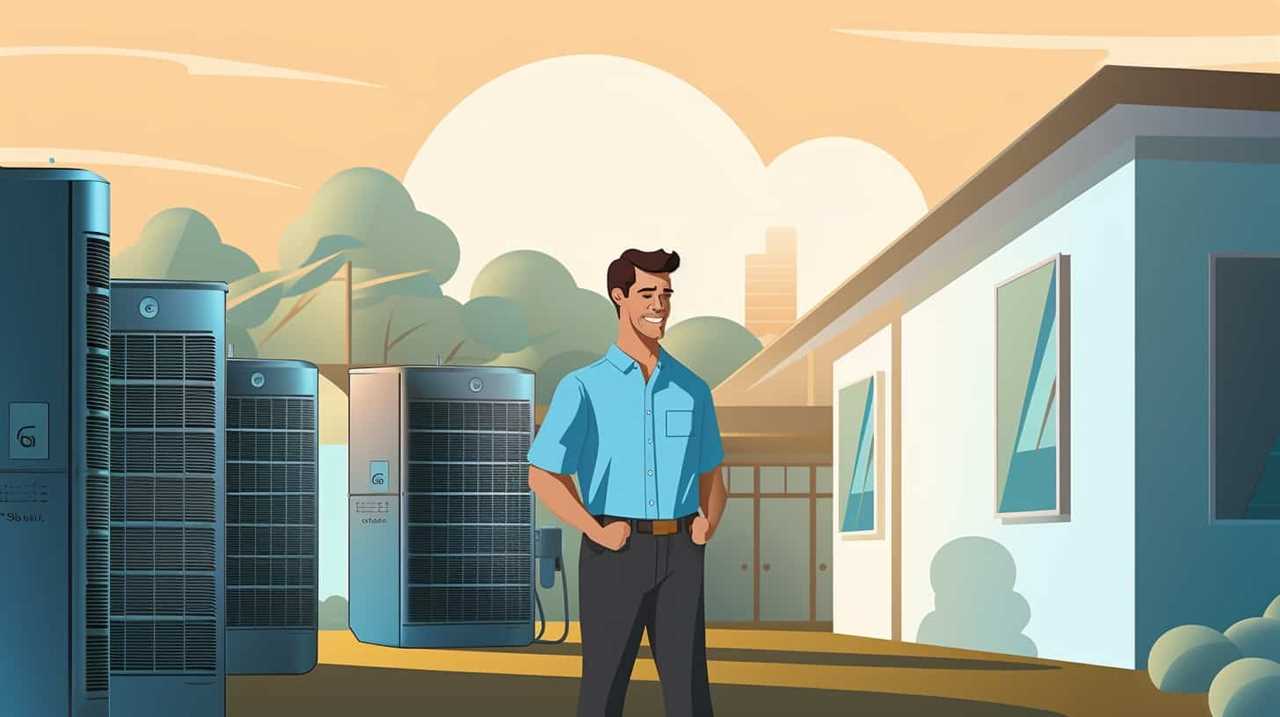
| Common Cooling Problems | Potential Causes |
|---|---|
| Inadequate airflow | Dirty or clogged air filter |
| Refrigerant leaks | Damaged or worn-out components |
| Faulty thermostat | Incorrect settings or faulty wiring |
Frequently Asked Questions
How Often Should I Schedule Maintenance for My Heat Pump?
We recommend scheduling maintenance for your heat pump at least once a year to ensure optimal heat pump performance. Regular maintenance helps identify and fix any issues early on, improving efficiency and extending its lifespan.
Can I Use My Heat Pump During Extremely Cold Weather Conditions?
Yes, you can use your heat pump during extremely cold weather conditions. Despite the misconception that heat pumps don’t work well in the cold, they actually provide efficient heating and offer numerous benefits in low temperatures.
What Size Heat Pump Do I Need for My Home?
When considering heat pump sizing for your home, it is important to determine the heat pump capacity needed. Factors such as square footage, insulation, and climate must be considered to ensure optimal performance and efficiency.
How Long Does a Heat Pump Typically Last Before Needing to Be Replaced?
Heat pumps typically last around 15 to 20 years before needing replacement. Signs of a failing heat pump include reduced heating or cooling capacity, strange noises, and frequent breakdowns. Regular maintenance can extend its lifespan.
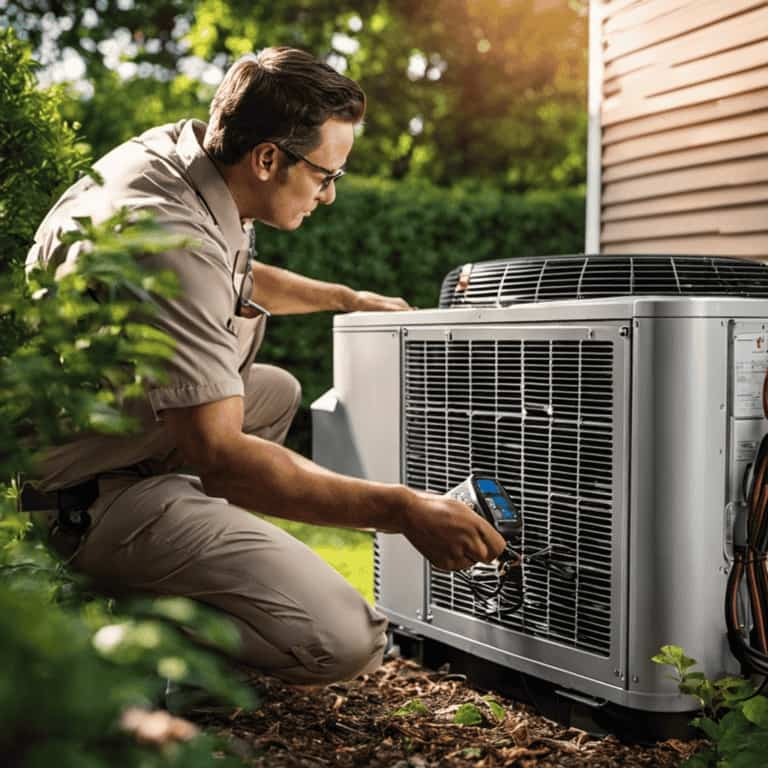
What Can I Do to Improve the Energy Efficiency of My Heat Pump?
To improve the energy efficiency of our heat pump, we can perform regular heat pump maintenance and troubleshooting. By keeping the system clean, checking for leaks, and ensuring proper airflow, we can maximize its efficiency and save on energy costs.
Conclusion
In conclusion, maintaining a properly functioning air conditioning heat pump is crucial for a comfortable indoor environment. By addressing common heat pump problems, troubleshooting heating issues, and fixing cooling problems, you can ensure efficient and reliable performance.
Just like a well-oiled machine, a well-maintained heat pump will keep your home cool in the summer and warm in the winter, creating a soothing oasis amidst the heat or chill outside.
Air Conditioning
ROI Breakdown: Cost Benefits of Efficient Heat Pumps

Get ready for an exciting exploration into the world of efficient heat pumps and the cost savings they can provide.
You might think, ‘Heat pumps? Meh.’ But trust us, these bad boys are game-changers. We’ll break down the ROI (return on investment) and show you just how much money you can save in the long run.
Get ready to be wowed by the cost benefits of these innovative energy-efficient heat pumps. Let’s get started!
Key Takeaways
- Efficient heat pumps can save up to 30-60% on energy bills compared to conventional heating systems.
- The initial investment cost of efficient heat pumps can be recouped through reduced energy consumption and lower utility bills.
- Calculating the payback period is important to determine the return on investment of efficient heat pumps.
- Government incentives and rebates can offset the initial cost and maximize the return on investment for energy-efficient heat pumps.
The Importance of Energy Efficiency in Heat Pump Systems
We understand the significance of energy efficiency in heat pump systems. When it comes to energy consumption, heat pumps play a crucial role in reducing overall energy usage and promoting sustainability. By using a smaller amount of electricity to transfer heat from one place to another, heat pumps offer a more efficient alternative to traditional heating and cooling systems.
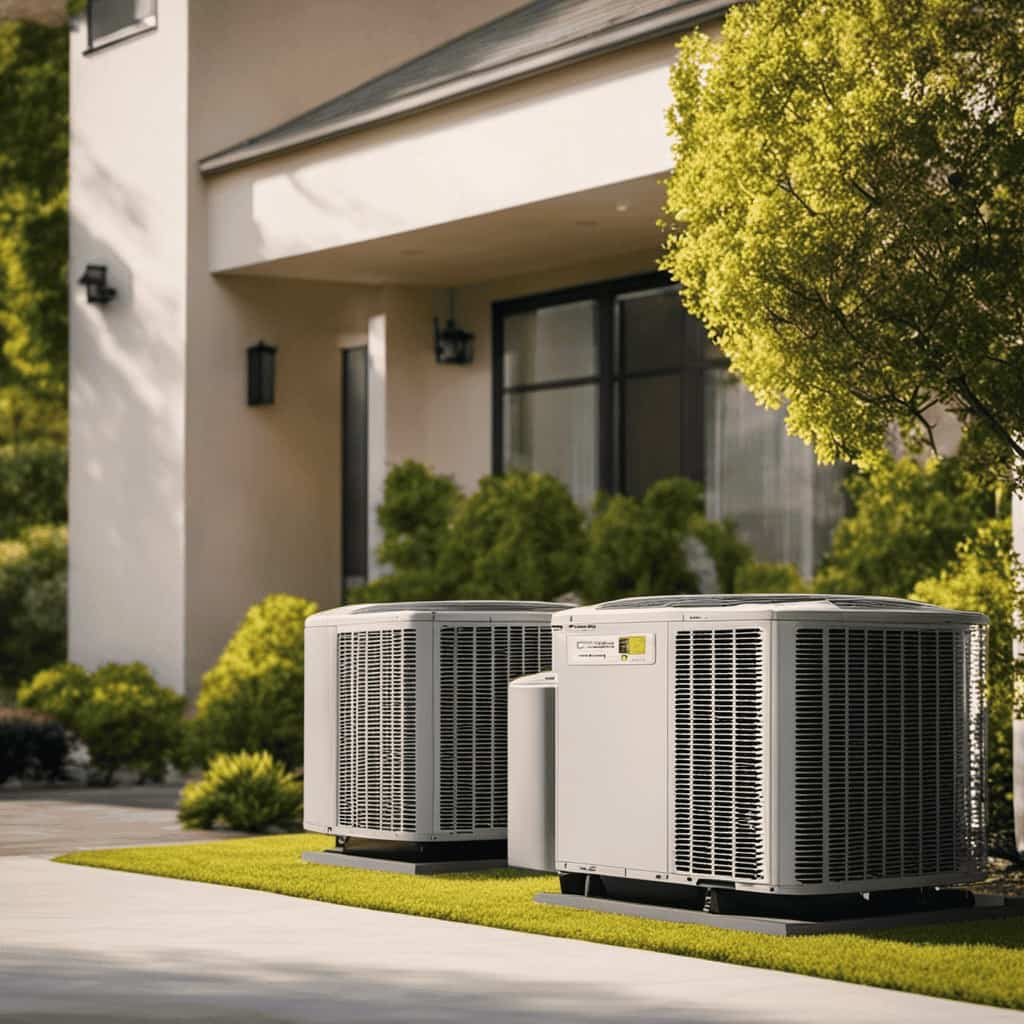
This increased efficiency leads to significant cost savings for consumers. Heat pumps can save up to 30-60% on energy bills compared to conventional heating systems. With rising energy costs and a growing concern for the environment, investing in energy-efficient heat pump systems is a smart choice.
Not only do they help reduce carbon emissions, but they also provide long-term financial benefits through reduced energy consumption and lower utility bills.
Understanding the Initial Investment Costs of Efficient Heat Pumps
The initial investment costs of efficient heat pumps can vary depending on factors such as the size of the system, installation requirements, and any additional features or upgrades. When considering the cost of an efficient heat pump, it’s important to calculate the payback period to determine the return on investment.
This involves comparing the upfront costs with the potential savings in energy bills over time. It’s also beneficial to compare different models to find the most cost-effective option. While some heat pumps may have a higher initial cost, they may offer greater energy efficiency and lower operating costs in the long run, resulting in a quicker payback period.
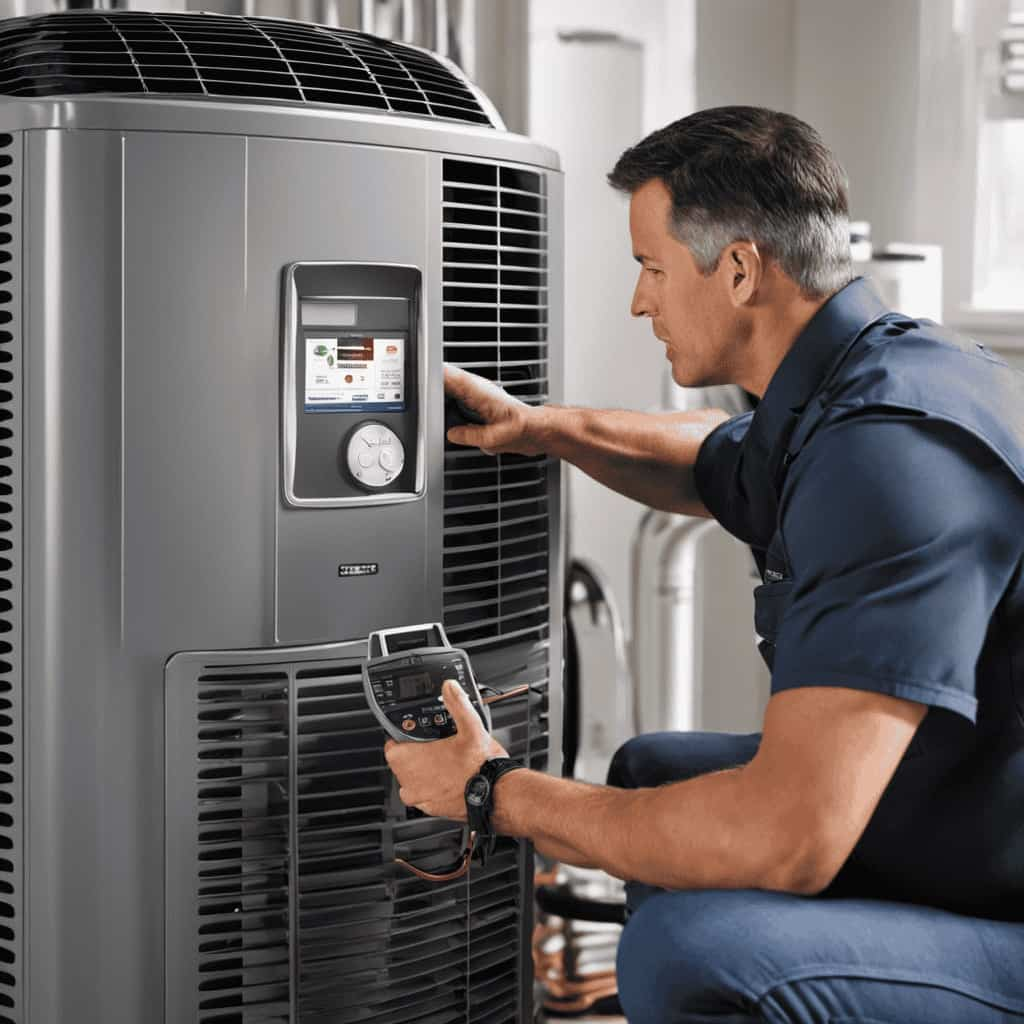
Calculating the Long-Term Savings From Energy Efficient Heat Pumps
To accurately determine the long-term savings from energy efficient heat pumps, we must carefully calculate the potential reduction in energy consumption and corresponding cost savings over an extended period of time. Calculating payback and return on investment (ROI) is essential in understanding the financial benefits of upgrading to an energy efficient heat pump system.
By comparing the energy consumption of a traditional heating system to that of an efficient heat pump, we can estimate the annual energy savings. Multiplying these savings by the expected lifespan of the heat pump gives us the total energy savings over the long term.
To calculate the payback period, we divide the initial investment cost by the annual energy savings. This provides an estimate of how long it will take for the energy savings to cover the cost of the heat pump upgrade.
Transitioning into the next section, exploring government incentives and rebates for heat pump efficiency upgrades, we’ll discuss how these incentives can further enhance the financial benefits of installing energy efficient heat pumps.
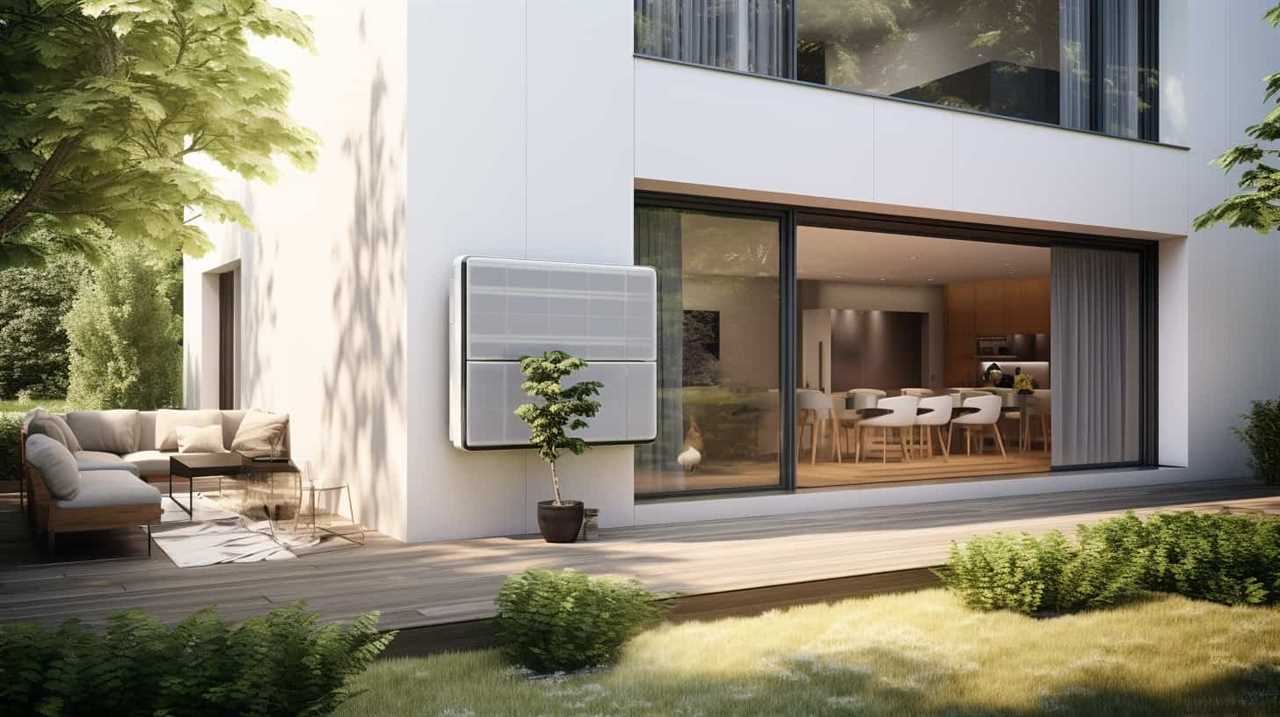
Exploring Government Incentives and Rebates for Heat Pump Efficiency Upgrades
Exploring government incentives and rebates can significantly enhance the financial benefits of upgrading to energy efficient heat pumps. Here are three reasons why taking advantage of these programs is a smart move:
-
Government incentives: Many governments offer financial assistance in the form of grants or rebates to encourage energy efficiency upgrades. These incentives can help offset the initial cost of purchasing and installing a heat pump, reducing the overall expenses.
-
Tax credits: In some regions, homeowners may be eligible for tax credits when they invest in energy efficient upgrades like heat pumps. These credits can further reduce the upfront cost and increase the potential for long-term cost savings.
-
Cost savings and payback period: By upgrading to an energy efficient heat pump, homeowners can significantly reduce their energy consumption and lower their utility bills. The cost savings over time can help recoup the initial investment and shorten the payback period.

Considering these financial benefits, it’s clear that government incentives and rebates play a crucial role in maximizing the return on investment for energy efficient heat pumps.
Now, let’s delve into the environmental benefits of these upgrades.
Considering the Environmental Benefits of Energy Efficient Heat Pumps
For homeowners, maximizing the return on investment for energy efficient heat pumps involves considering the environmental benefits and the potential for long-term sustainability.
Energy efficient heat pumps have a significantly lower environmental impact compared to traditional heating and cooling systems. By utilizing advanced technology and renewable energy sources, these heat pumps reduce greenhouse gas emissions and help to combat climate change. They achieve this by consuming less energy and producing fewer carbon emissions during operation.

This not only reduces the homeowner’s carbon footprint but also contributes to the overall reduction in pollution and dependence on fossil fuels.
In addition, energy efficient heat pumps promote sustainability by utilizing renewable energy sources such as solar power, geothermal energy, or air-source heat pumps. This further reduces the reliance on non-renewable resources and ensures a more environmentally friendly heating and cooling solution.
Frequently Asked Questions
Are There Any Maintenance Costs Associated With Efficient Heat Pumps?
Yes, there are maintenance costs associated with efficient heat pumps. However, these costs are outweighed by the long-term efficiency benefits, making them a worthwhile investment for those seeking innovative and cost-effective heating solutions.
How Long Do Efficient Heat Pumps Typically Last?
Efficient heat pumps typically last for around 15 to 20 years. Their long lifespan offers numerous benefits, such as lower replacement costs and increased energy savings over time.
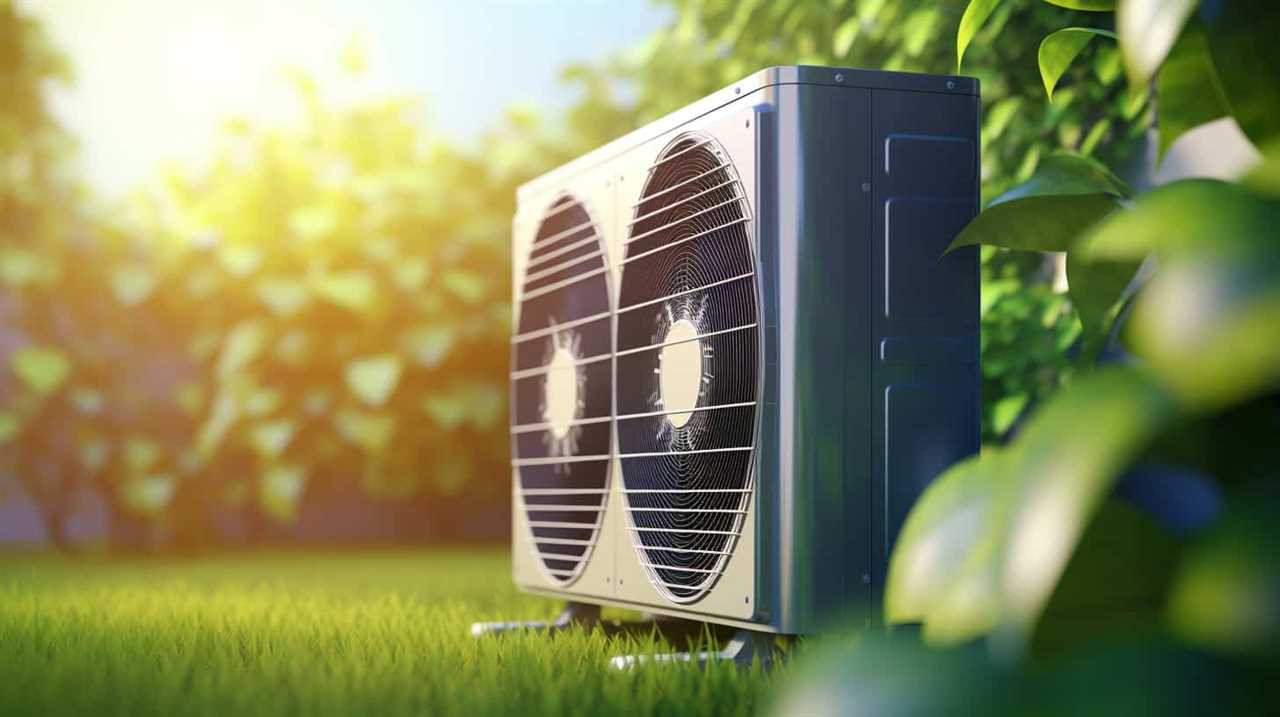
Can I Install an Efficient Heat Pump Myself, or Do I Need to Hire a Professional?
Installing an efficient heat pump yourself can save money, but it requires expertise and may void warranties. Hiring a professional ensures proper installation, optimizing performance and ensuring safety. Consider cost, time, and skill level when deciding DIY or professional installation.
Do Efficient Heat Pumps Work Well in All Climates?
Efficient heat pumps generally work well in all climates, but their performance may vary. They can significantly impact energy bills by efficiently heating or cooling a space.
Are There Any Potential Drawbacks or Limitations to Using Energy Efficient Heat Pumps?
There may be potential disadvantages to using energy efficient heat pumps, such as the impact on the electricity grid. However, it is important to consider the overall benefits and innovations these pumps bring to the table.
Conclusion
In conclusion, investing in energy efficient heat pumps can provide significant long-term cost savings.
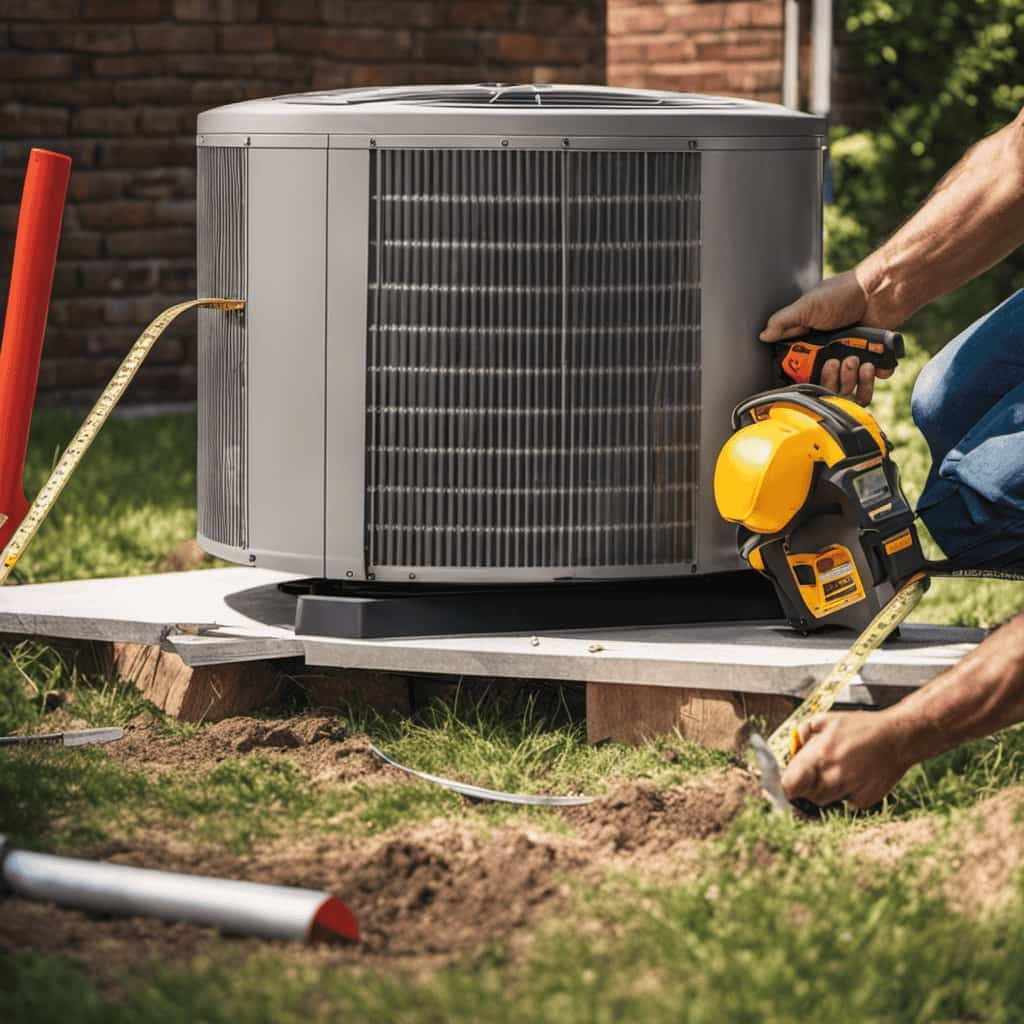
According to a study by the U.S. Department of Energy, energy efficient heat pumps can reduce heating and cooling costs by up to 50%. This statistic highlights the potential financial benefits that homeowners and businesses can enjoy by upgrading to more efficient heating systems.
Additionally, the availability of government incentives and rebates further enhances the affordability and attractiveness of these energy saving solutions.
Air Conditioning
Deciphering Heat Pump Energy Efficiency Ratings

Are you interested in learning more about the mysteries surrounding heat pump energy efficiency ratings? Don’t worry, we have all the information you need!
In this article, we’ll dive into the fascinating world of deciphering these ratings. We’ll unravel the secrets of SEER and HSPF ratings, explore the factors that affect energy efficiency, and compare different heat pump models.
Plus, we’ll share some handy tips for maximizing energy efficiency in your own heat pump system.
Get ready to unravel the enigma of heat pump energy efficiency!
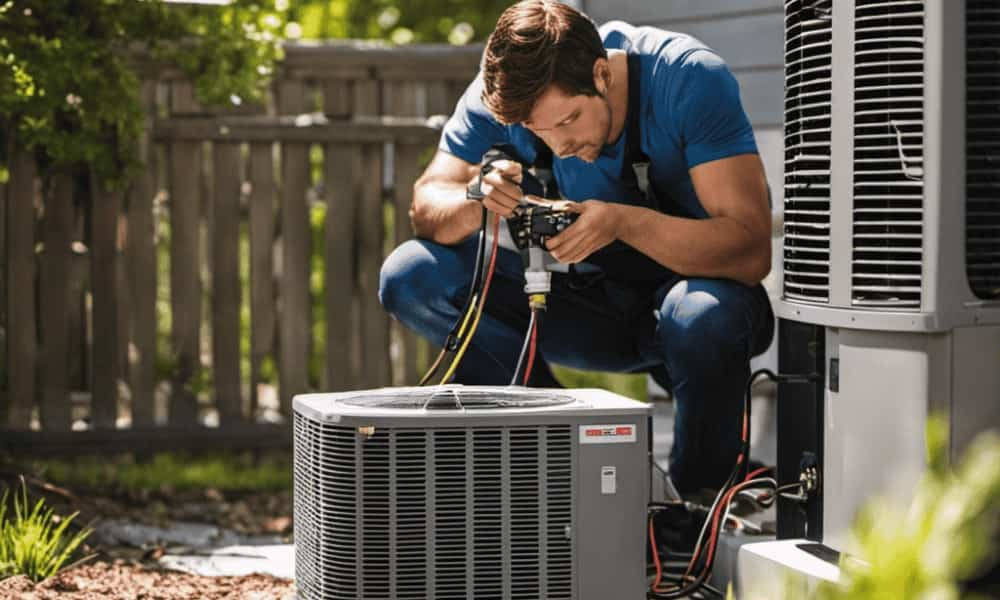
Key Takeaways
- Energy efficiency ratings, such as SEER and HSPF, are crucial for choosing a heat pump that saves energy and meets government regulations.
- Higher SEER and HSPF ratings indicate better efficiency, lower energy consumption, and reduced utility bills.
- Factors such as proper installation, regular maintenance, appropriate sizing, and external factors like temperature and insulation quality impact energy efficiency.
- Comparing energy efficiency ratings helps determine the most cost-effective and energy-efficient heat pump model.
The Importance of Energy Efficiency Ratings in Heat Pumps
When it comes to heat pumps, understanding and considering energy efficiency ratings is crucial for us. We want to make sure we invest in a system that not only provides us with the benefits of heat pumps for energy savings but also meets the requirements set by government regulations.
Energy efficiency ratings, such as the Seasonal Energy Efficiency Ratio (SEER) and Heating Seasonal Performance Factor (HSPF), give us a clear indication of how well a heat pump can convert electricity into heating or cooling output. Higher ratings mean better efficiency and lower energy consumption, leading to reduced utility bills and environmental impact.
Government regulations play a vital role in promoting energy efficiency in heat pumps by setting minimum standards and encouraging manufacturers to develop more advanced and eco-friendly technologies.
Understanding SEER and HSPF Ratings for Heat Pumps
Our understanding of SEER (Seasonal Energy Efficiency Ratio) and HSPF (Heating Seasonal Performance Factor) ratings is key to determining the energy efficiency of heat pumps. These ratings serve as important heat pump performance indicators, allowing us to interpret energy efficiency ratings and make informed decisions about the most suitable heat pump for our needs.

SEER measures the cooling efficiency of a heat pump and is calculated by dividing the cooling output by the energy input over an entire cooling season. The higher the SEER rating, the more efficient the heat pump is at cooling.
On the other hand, HSPF measures the heating efficiency of a heat pump and is calculated by dividing the heat output by the energy input over an entire heating season. A higher HSPF rating indicates a more efficient heat pump at heating.
Understanding these ratings is crucial for homeowners looking to maximize energy savings and reduce their carbon footprint.
Now that we have a grasp of SEER and HSPF ratings, let’s delve into the factors that affect heat pump energy efficiency.
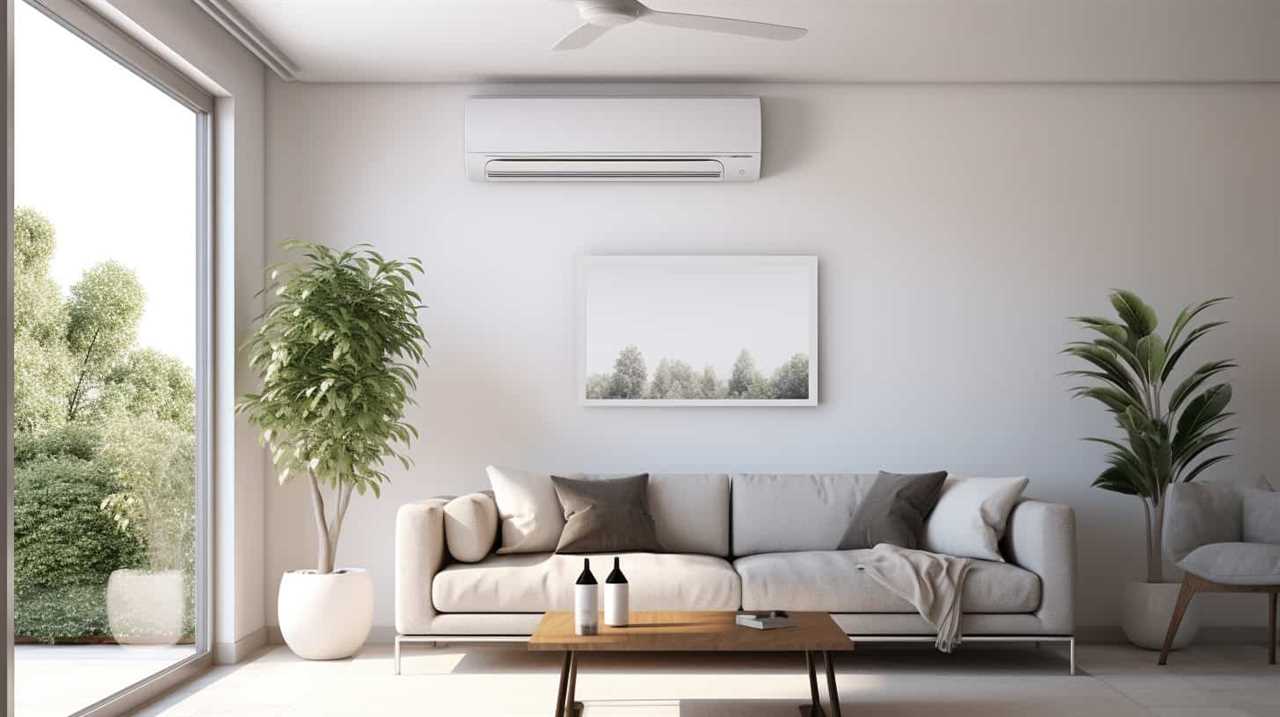
Factors Affecting Heat Pump Energy Efficiency
Some of the key factors that can affect the energy efficiency of heat pumps include proper installation, regular maintenance, and appropriate sizing of the unit. Taking care of these factors is crucial to ensure optimal performance and energy savings. Here are some important considerations:
-
Proper Installation: A correctly installed heat pump will operate efficiently and effectively. Improper installation can lead to air leaks, poor airflow, and decreased energy efficiency.
-
Regular Maintenance: Regular heat pump maintenance is essential for optimal energy efficiency. This includes cleaning or replacing filters, checking refrigerant levels, and inspecting electrical connections. Regular maintenance helps to identify and address any issues before they escalate and impact energy efficiency.
-
Appropriate Sizing: Choosing the right size heat pump for your space is vital. An undersized unit will struggle to heat or cool your home efficiently, while an oversized unit can lead to short cycling, wasting energy. Proper sizing ensures optimal energy efficiency and comfort.

Comparing Energy Efficiency Ratings of Different Heat Pump Models
How do we compare the energy efficiency ratings of different heat pump models?
When evaluating cost effectiveness and analyzing long term savings, it’s crucial to consider the energy efficiency ratings of different heat pump models.
The rating to look for is the Seasonal Energy Efficiency Ratio (SEER) for cooling and Heating Seasonal Performance Factor (HSPF) for heating.
These ratings provide an indication of how efficiently the heat pump operates throughout the year.

A higher SEER and HSPF rating means greater energy efficiency and potential long-term savings on energy bills.
It’s important to compare the SEER and HSPF ratings of different models to determine which heat pump will offer the most cost-effective and energy-efficient solution for your specific needs.
Tips for Maximizing Energy Efficiency in Heat Pump Systems
To maximize energy efficiency in heat pump systems, we can implement several tips and techniques. Here are some practical strategies to consider:
-
Regular maintenance: Schedule annual maintenance for your heat pump system to ensure it operates at its peak performance. This includes cleaning or replacing filters, inspecting ductwork, and lubricating moving parts.

-
Optimal thermostat settings: Set your thermostat to the most energy-efficient temperature for each season. Consider using programmable or smart thermostats to automatically adjust temperatures based on your schedule.
-
Proper insulation: Insulate your home properly to minimize heat loss during winter and heat gain during summer. This helps reduce the workload on your heat pump, resulting in lower energy consumption.
Frequently Asked Questions
Are Heat Pump Energy Efficiency Ratings Standardized Across Different Countries?
Yes, heat pump energy efficiency ratings can vary across different countries. International heat pump energy efficiency standards differ, making a comparison of heat pump energy efficiency standards necessary to ensure accurate and meaningful analysis.
How Do Heat Pump Energy Efficiency Ratings Affect the Overall Cost of Operating a Heat Pump System?
Heat pump energy efficiency ratings have a significant impact on the overall cost of operating a system. Higher ratings result in lower energy consumption, leading to long-term savings and environmental benefits.
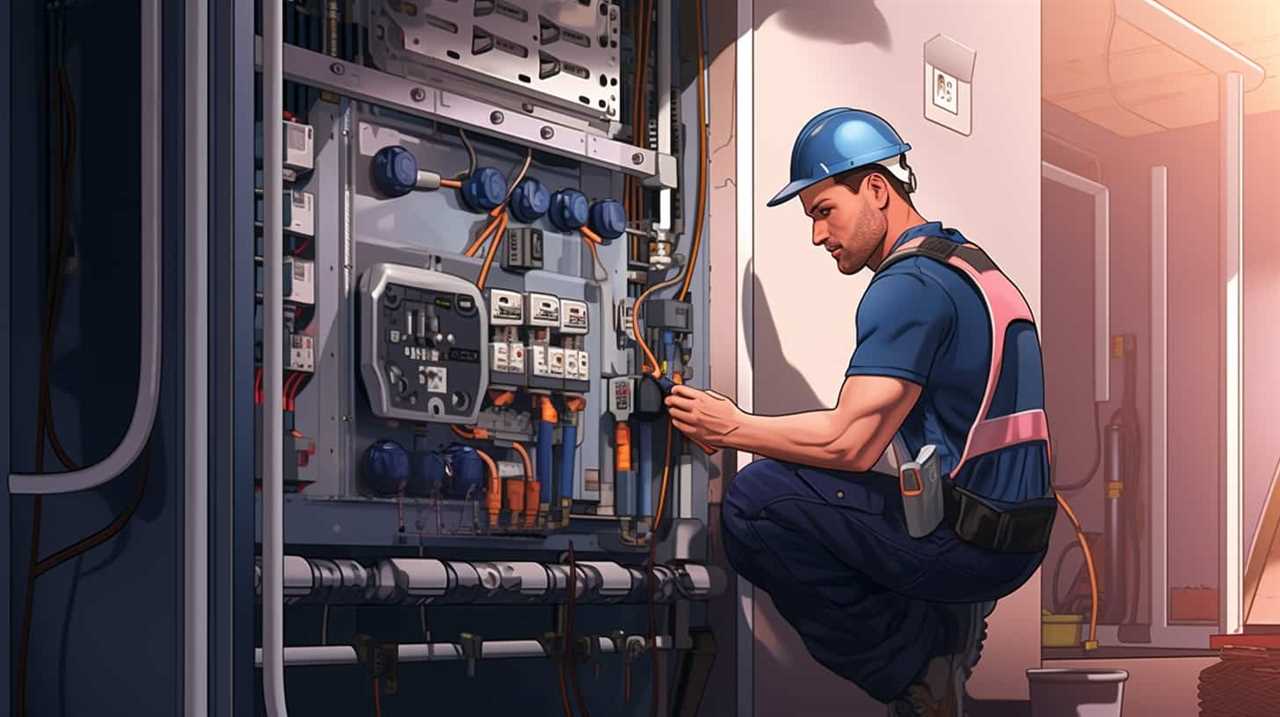
Can I Rely Solely on the Energy Efficiency Ratings to Determine the Performance of a Heat Pump?
We can’t rely solely on energy efficiency ratings to determine a heat pump’s performance. While they provide insight, factors like reliability and long-term savings are crucial in evaluating overall effectiveness.
What Are the Potential Drawbacks of Choosing a Heat Pump With a Higher Energy Efficiency Rating?
When considering a heat pump with a higher energy efficiency rating, potential drawbacks may include increased upfront costs, more complex installation and maintenance requirements, and the need for additional equipment or modifications to existing systems.
Are There Any Additional Factors to Consider When Comparing the Energy Efficiency Ratings of Heat Pump Models?
When comparing energy efficiency ratings of heat pump models, there are additional factors and comparison considerations. These include installation costs, maintenance requirements, warranty coverage, and the availability of qualified technicians for service and repairs.
Conclusion
In conclusion, the energy efficiency ratings of heat pumps are absolutely crucial for ensuring optimal performance and cost savings.
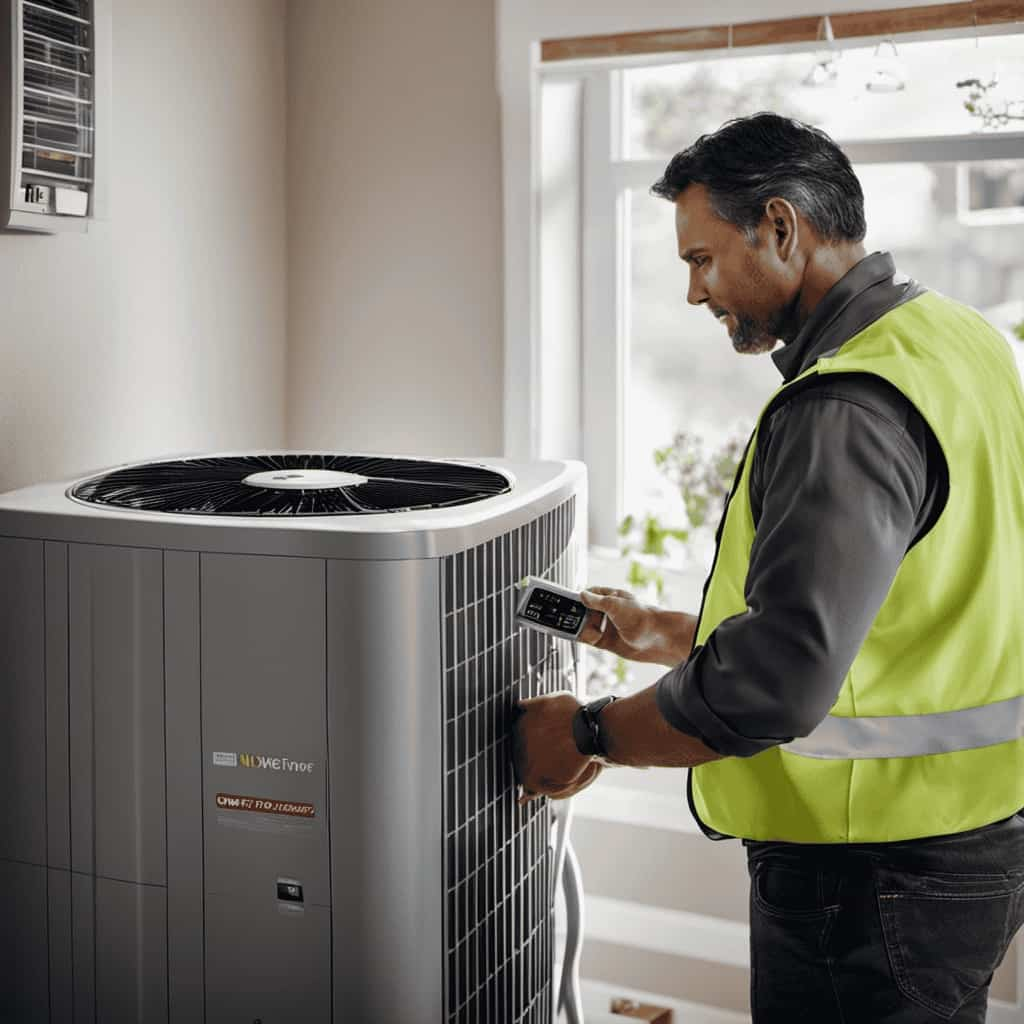
These ratings, such as SEER and HSPF, provide valuable information about a heat pump’s ability to efficiently convert energy into heat or cool air. By understanding and comparing these ratings, consumers can make informed decisions when selecting a heat pump model.
Additionally, implementing energy-saving practices can further enhance the overall energy efficiency of heat pump systems. So, let’s not underestimate the significance of energy efficiency ratings in maximizing the efficiency of heat pumps!
Air Conditioning
Journey Towards Efficient Energy Conservation With Heat Pumps

We have come across an incredible statistic: heat pumps have the potential to decrease energy usage by as much as 50%! Come along with us as we work towards more efficient energy conservation using heat pumps.
In this article, we’ll delve into the basics, explore efficiency ratings, and share effective tips for optimizing performance.
We’ll also explore advanced features that enhance energy savings.
Along the way, we’ll showcase real-life case studies that demonstrate the power of heat pumps in preserving our planet’s resources.

Let’s embark on this exciting journey together!
Key Takeaways
- Heat pumps can both heat and cool a space efficiently, providing heating and cooling while using minimal energy.
- Heat pumps can save up to 50% on energy bills compared to traditional systems and reduce greenhouse gas emissions.
- Efficiency ratings such as SEER, HSPF, COP, EER, and AFUE measure the cooling and heating efficiency of heat pumps.
- Regular maintenance, proper airflow, and cleaning and replacing air filters are essential for optimizing heat pump performance.
The Basics of Heat Pumps for Energy Conservation
Let’s start by understanding how heat pumps work to conserve energy.
Heat pumps are highly efficient systems that can both heat and cool a space, making them a great choice for energy-conscious individuals.
The installation of a heat pump involves the use of a refrigerant that absorbs heat from the air or ground and transfers it indoors or outdoors, depending on the desired temperature.
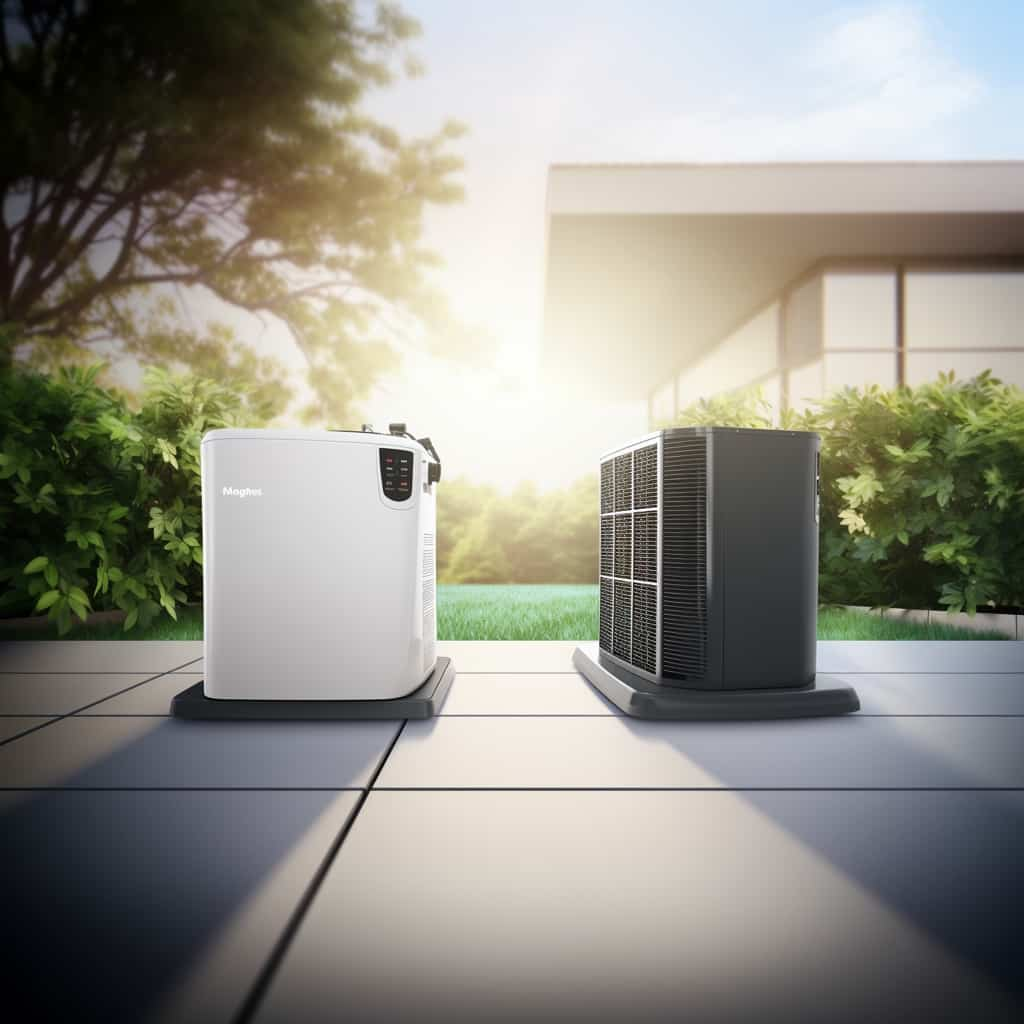
This process allows heat pumps to provide heating during the colder months and cooling during the hotter months, all while using minimal energy.
The benefits of heat pumps are numerous. They can save up to 50% on energy bills compared to traditional heating and cooling systems, reduce greenhouse gas emissions, and improve indoor air quality.
With proper installation and maintenance, heat pumps can offer long-term energy savings and comfort.
Understanding the Efficiency Ratings of Heat Pumps
We can gain a clear understanding of the efficiency ratings of heat pumps by examining their performance and energy-saving capabilities. When considering the efficiency of a heat pump, there are several key factors to take into account:

- Seasonal Energy Efficiency Ratio (SEER): This measures the cooling efficiency of the heat pump during the cooling season.
- Heating Seasonal Performance Factor (HSPF): This measures the heating efficiency of the heat pump during the heating season.
- Coefficient of Performance (COP): This represents the ratio of heat output to energy input and is an indicator of overall efficiency.
- Energy Efficiency Ratio (EER): This measures the cooling efficiency of the heat pump under specific conditions.
- Annual Fuel Utilization Efficiency (AFUE): This measures the heating efficiency of the heat pump when using fossil fuels.
Effective Tips for Optimizing Heat Pump Performance
To maximize heat pump performance, we recommend implementing these three effective tips for maintenance and troubleshooting common issues:
| Tips for Optimizing Heat Pump Performance |
|---|
| Regularly clean and replace air filters |
| Ensure proper airflow in and around the unit |
| Schedule annual professional maintenance |
Regularly cleaning and replacing air filters is crucial for efficient heat pump operation. Clogged filters restrict airflow, reducing performance and potentially causing system malfunctions. Additionally, ensuring proper airflow in and around the unit is essential. Keep the outdoor unit clear of debris and vegetation to prevent airflow obstructions. Lastly, scheduling annual professional maintenance will help identify and address any potential issues before they become major problems. By following these tips, you can optimize your heat pump’s performance and extend its lifespan.
Transitioning into the next section, we will now explore advanced features that can further enhance energy savings.
Exploring Advanced Features for Enhanced Energy Savings
As we delve into the topic of exploring advanced features for enhanced energy savings, we’ll examine how these features can further optimize heat pump performance. By utilizing smart technology and cost-effective solutions, heat pumps can become even more efficient in conserving energy. Here are some advanced features that can contribute to enhanced energy savings:
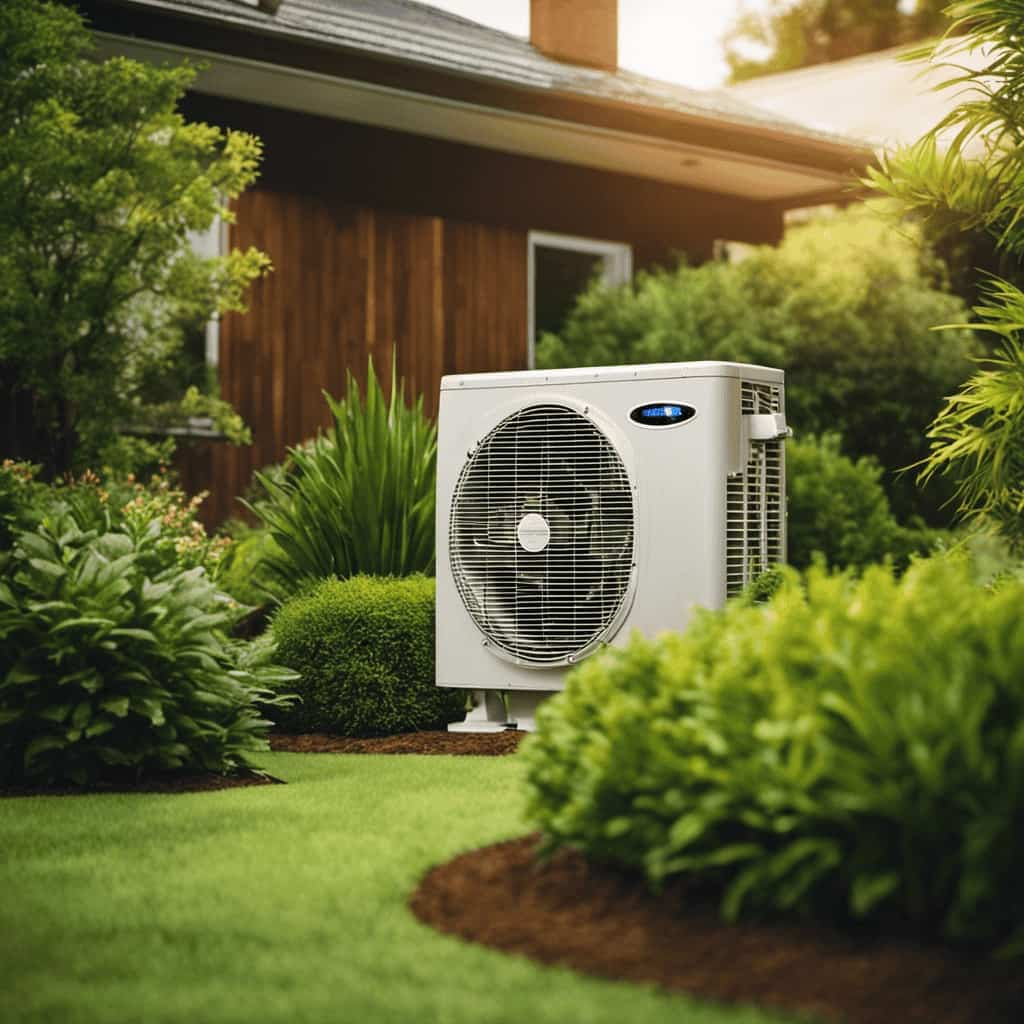
-
Variable-speed compressors: These compressors adjust their speed based on the heating or cooling demand, resulting in more precise temperature control and reduced energy consumption.
-
Demand defrost: This feature monitors the frost buildup on the outdoor unit and activates the defrost cycle only when necessary, saving energy by minimizing unnecessary defrost cycles.
-
Energy monitoring systems: These systems provide real-time information about energy consumption, allowing homeowners to identify areas where energy can be saved and make adjustments accordingly.
-
Heat recovery ventilation: This technology recovers heat from the exhaust air and uses it to preheat incoming fresh air, reducing the workload on the heat pump.

-
Intelligent zoning controls: By dividing the space into zones and controlling the temperature independently, this feature ensures that energy is only used where and when needed.
By incorporating these advanced features, heat pumps can achieve maximum energy savings without compromising comfort.
Now, let’s move on to the next section where we’ll explore real-life examples of energy conservation with heat pumps through case studies.
Case Studies: Real-Life Examples of Energy Conservation With Heat Pumps
By regularly analyzing and documenting real-life examples, we can gain valuable insights into how heat pumps have successfully conserved energy in various settings.
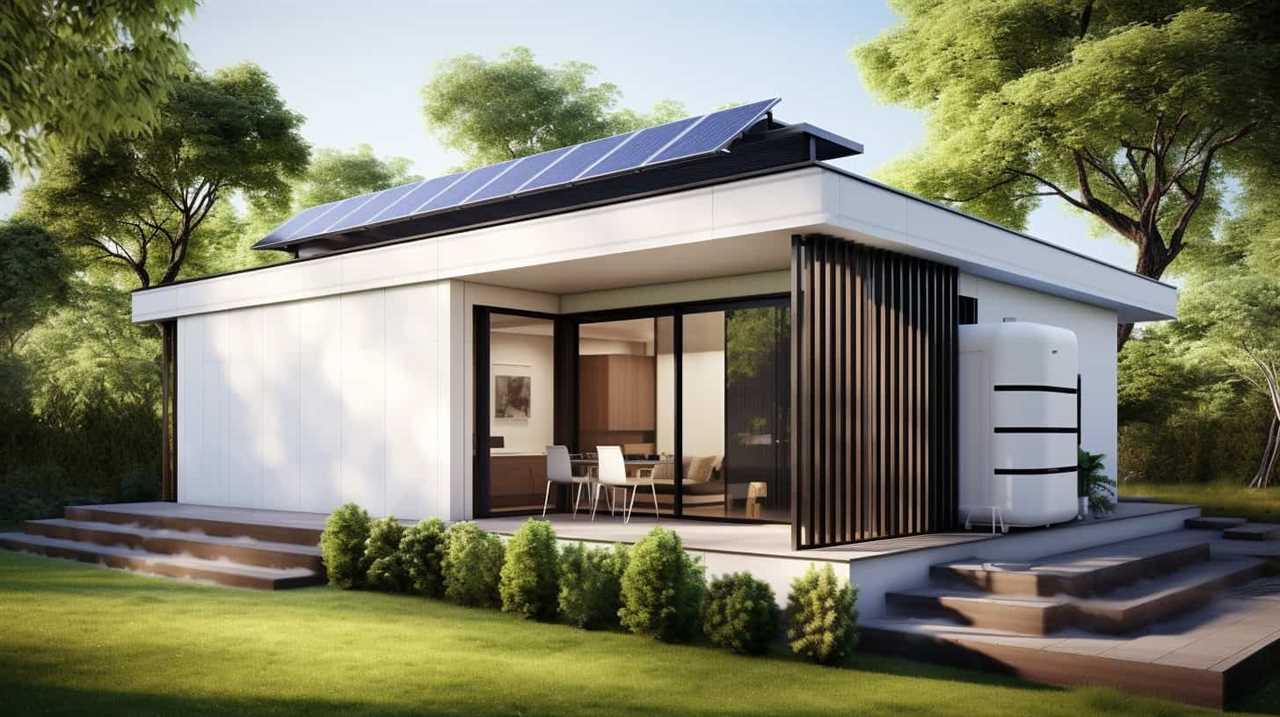
One area where heat pumps have proven to be highly effective is in commercial buildings, where energy savings are of utmost importance. Case studies have shown that the implementation of heat pumps in commercial buildings can result in significant energy savings. By utilizing the heat transfer capabilities of heat pumps, commercial buildings can reduce their reliance on traditional heating and cooling systems, thereby reducing energy consumption and costs.
Moreover, heat pumps have a positive impact on the carbon footprint of commercial buildings. By utilizing renewable energy sources and operating at higher energy efficiencies, heat pumps help to minimize greenhouse gas emissions and contribute to a more sustainable future.
These case studies demonstrate the practical and tangible benefits of heat pumps in conserving energy and reducing the carbon footprint of commercial buildings.
Frequently Asked Questions
Can Heat Pumps Be Used in All Climates?
Yes, heat pumps can be used in all climates. However, there are limitations in extreme climates where the efficiency may decrease. Factors like temperature and humidity affect the performance and effectiveness of heat pumps.
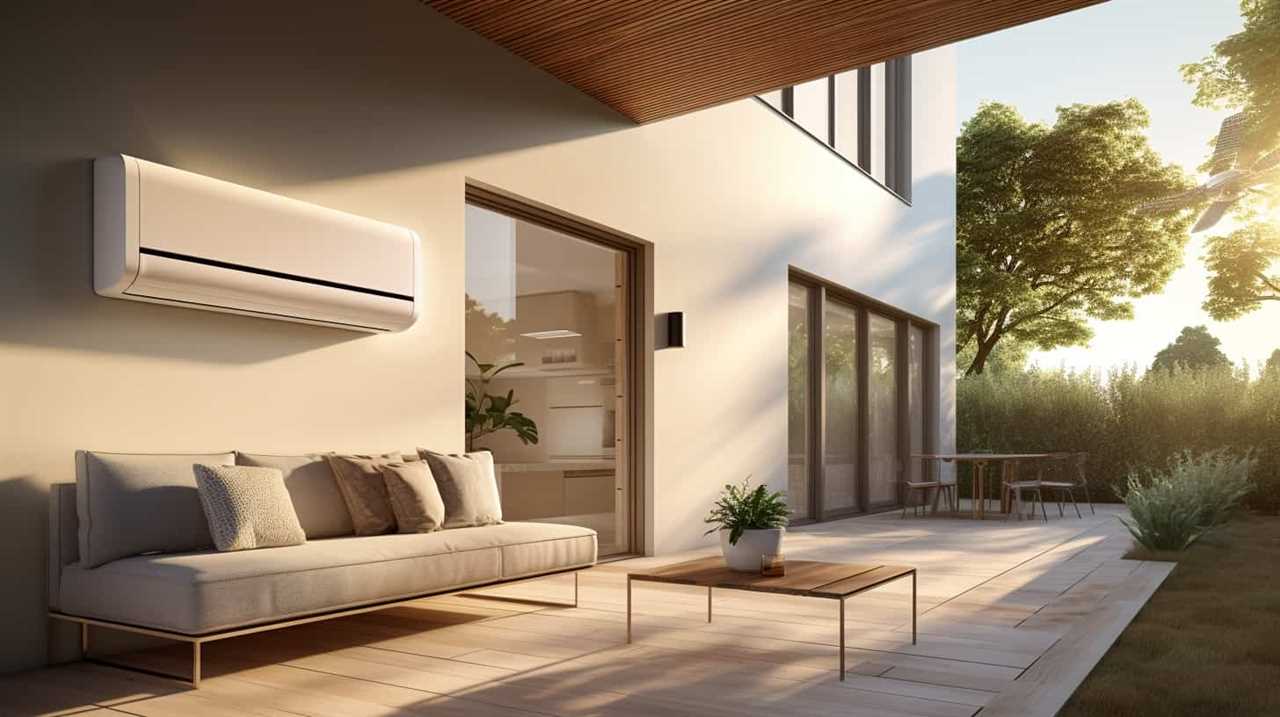
What Is the Average Lifespan of a Heat Pump?
The average lifespan of a heat pump depends on various factors, such as regular heat pump maintenance and usage. However, heat pumps typically last around 15-20 years. This longevity is one of the many benefits of heat pumps.
Are Heat Pumps Eligible for Any Government Incentives or Rebates?
Yes, heat pumps are eligible for government incentives and rebates. These incentives aim to promote energy efficiency and encourage the use of heat pumps as a sustainable heating and cooling solution.
How Much Noise Does a Heat Pump Produce?
Heat pumps produce varying levels of noise, influenced by factors such as the unit’s size, location, and insulation. Noise levels range from a gentle hum to the sound of a refrigerator running.
Can a Heat Pump Be Used for Both Heating and Cooling Purposes?
Yes, a heat pump can be used for both heating and cooling purposes. It is an efficient system that transfers heat between the indoors and outdoors, providing warmth in winter and cool air in summer. The heat pump efficiency depends on factors such as proper installation and maintenance. However, it is important to consider the initial heat pump installation costs.
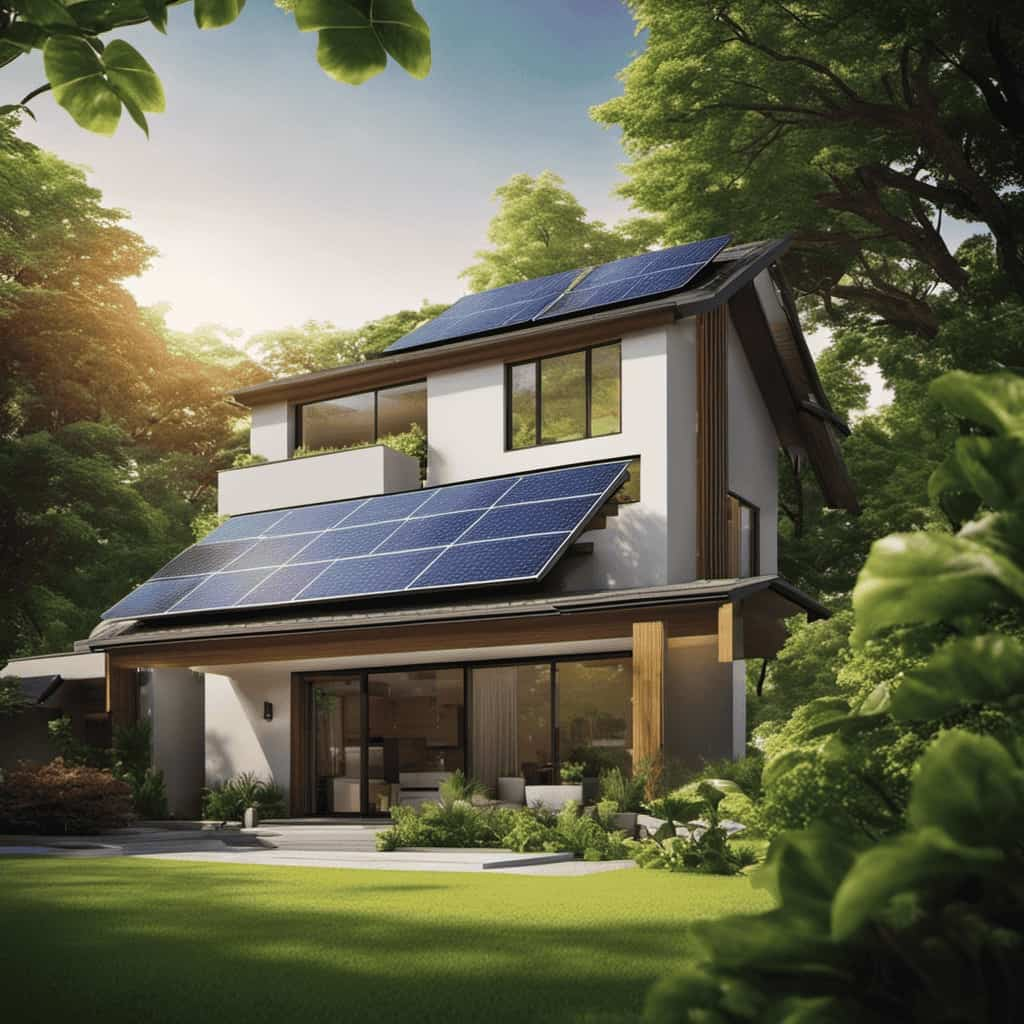
Conclusion
In conclusion, heat pumps are a highly efficient and effective solution for energy conservation. With their advanced features and optimization tips, heat pumps can significantly reduce energy consumption and costs.
One interesting statistic to consider is that heat pumps can provide up to 300% more heating or cooling energy compared to the electricity they consume. This highlights the remarkable efficiency of heat pumps and their potential to make a significant impact on energy conservation efforts.
-

 Residential and Commercial Applications1 week ago
Residential and Commercial Applications1 week agoBest Amana Heat Pump Reviews
-

 Thermal Energy Transfer2 weeks ago
Thermal Energy Transfer2 weeks agoBreakthroughs in Modern Heat Pump Systems: Thermal Energy Edition
-

 Residential and Commercial Applications1 week ago
Residential and Commercial Applications1 week agoBest Heat Pump
-

 Geothermal Heat Pumps3 months ago
Geothermal Heat Pumps3 months agoUpgrade Your Comfort with Our Efficient HVAC Systems
-

 Air Conditioning2 months ago
Air Conditioning2 months agoExploring Energy-Efficient Air Conditioning Heat Pumps
-

 Geothermal Heat Pumps3 months ago
Geothermal Heat Pumps3 months agoInnovative Geothermal Heat Pump Manufacturers Revolutionize Energy Efficiency
-

 Thermal Energy Transfer1 month ago
Thermal Energy Transfer1 month agoBoost Your Heat Pump Efficiency: Interactive Guide
-

 Residential and Commercial Applications1 week ago
Residential and Commercial Applications1 week agoBest Portable Heat Pump Heat & AC










